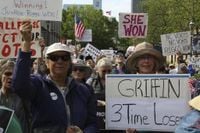A federal judge has ordered the North Carolina State Board of Elections to certify Democrat Allison Riggs as the winner of the contentious 2024 state Supreme Court election, rejecting Republican candidate Jefferson Griffin's challenges to thousands of ballots. The ruling, delivered by Chief U.S. District Judge Richard E. Myers II, comes nearly six months after the election and preserves Riggs' narrow victory by 734 votes out of more than 5.5 million ballots cast.
In his ruling on May 5, 2025, Judge Myers placed a one-week hold on his decision, allowing Griffin time to appeal. This ruling follows a series of legal battles initiated by Griffin, who sought to disqualify over 65,000 ballots, primarily targeting those cast by military and overseas voters who allegedly did not provide required identification.
Myers emphasized that retroactively changing election rules violates the constitutional rights of voters. He stated, "You establish the rules before the game. You don’t change them after the game is done." His ruling also highlighted the importance of equal protection under the law, as the process Griffin proposed would have treated certain voters differently based on their circumstances.
The dispute began after the November 5 election, where Riggs initially led Griffin by nearly 10,000 votes, but that margin shrank as more ballots were counted. Griffin's legal challenges included questioning ballots from overseas voters, including military personnel, who were exempt from ID requirements under federal law. He also challenged ballots from individuals he labeled as "Never Residents," claiming they had never lived in North Carolina.
In April 2025, the North Carolina Supreme Court partially sided with Griffin, ruling that military and overseas voters needed to verify their eligibility during a 30-day "cure period" or risk having their votes discarded. However, Myers' federal ruling invalidated this requirement, stating it imposed an unconstitutional burden on the right to vote.
Riggs, who has served as a justice since her appointment in 2023, expressed relief following the ruling. "Today, we won. I’m proud to continue upholding the Constitution and the rule of law as North Carolina’s Supreme Court Justice," she stated.
The case has garnered significant attention, with implications that extend beyond North Carolina. Legal experts warn that Griffin's attempts could set a precedent for similar challenges in other states, potentially undermining public confidence in electoral processes.
In his 68-page ruling, Myers addressed the broader implications of Griffin's challenge, stating, "This case concerns whether the federal Constitution permits a state to alter the rules of an election after the fact and apply those changes retroactively to only a select group of voters." He concluded that such actions would violate both equal protection and due process rights.
Despite the ruling, Griffin's campaign indicated that they are reviewing their options and may appeal to the 4th Circuit U.S. Court of Appeals. The outcome of this case remains pivotal, as it is the last election result from the 2024 cycle to be certified.
Democratic leaders hailed the decision as a victory for voters, with Ken Martin, chair of the Democratic National Committee, asserting that it must put an end to attempts to overturn legitimate election results. Riggs' victory solidifies the Democratic presence on the state Supreme Court, which has been a focal point of partisan contention.
As the political landscape in North Carolina continues to evolve, the ramifications of this ruling will likely resonate in future elections. The challenges faced by Riggs and the legal battles surrounding voter eligibility underscore the ongoing debates about access to the ballot and the integrity of electoral processes.
Judge Myers' ruling serves as a reminder of the importance of protecting voters' rights and maintaining the integrity of elections. As the legal wrangling unfolds, the eyes of the nation will remain on North Carolina, where the balance of justice, democracy, and the rule of law hang in the balance.





